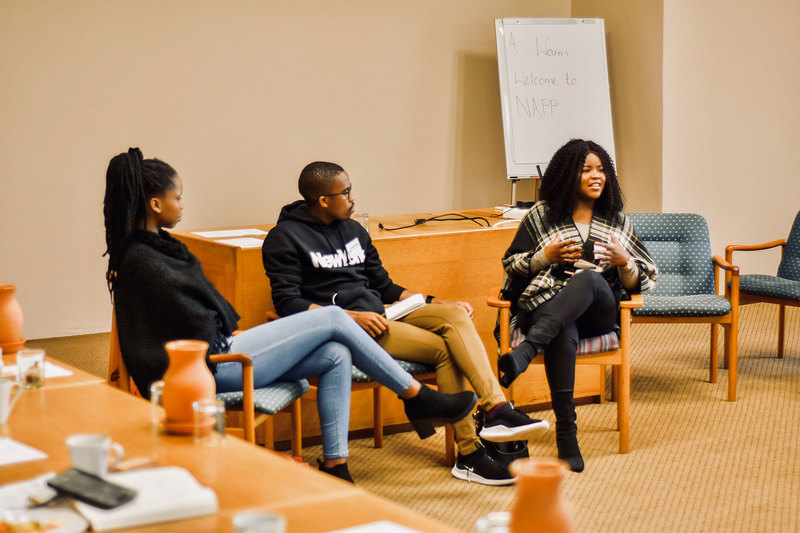Student Parliament makes virtual history
01 June 2020 | Story Penny Haw. Photo Supplied. Read time 7 min.
When the first quarter assembly of the Student Parliament of the University of Cape Town (UCT) got suspended because of the national lockdown, the 2020 Management Committee realised they would have to be inventive and resourceful to deliver their mandate and achieve their vision.
“Everything was in place for our first ordinary meeting of the year,” said Speaker of the Student Parliament Management Committee, Sarina Mpharalala. “The venue was booked, catering organised and vision set out, but then, when the date of the national lockdown was announced, we realised that it wouldn’t be possible to continue and our plans had to be suspended.”
Along with many others, committee members required a couple of weeks to deal with the uncertainties and anxiety around COVID-19 and to settle into new routines dictated by the lockdown. Shortly thereafter, Mpharalala remembered that she and her committee had been elected to undertake responsibilities and they needed to find a way of delivering on the mandate they had been given, despite the circumstances.
The Student Parliament is an assembly of all student organisations at the university. It serves as an advisory body to the Student Representative Council (SRC) on policy matters, but decisions taken by a two-thirds majority of the assembly are binding on the SRC. The Parliament helps ensure that the SRC and its substructures are accountable, transparent and rooted in the principles and values that are enshrined in the SRC constitution. Student Parliament meetings are held quarterly and are open to all registered students of the university to observe and participate without voting rights.
Reimagining a sitting
“The first step was to further engage via WhatsApp on the committee group so that we could begin discussing how we might proceed,” said Deputy Speaker of the Student Parliament Management Committee, Percy Mkhize. “It was soon agreed that we wanted to find a way of running with our vision despite the challenges.”
Driving the communication, Mpharalala emailed members notifying them of the committee’s intentions of finding the resources and means of holding a virtual assembly.
“Focusing on inclusivity, we needed to ensure that members would be able to attend,” she said. “This meant finding a way of funding data and making sure that everyone had the necessary devices. We waited for UCT to deliver laptops as required and authorised funding of data with treasury, which was achieved by redirecting funds that would have otherwise been used for catering.”
Doing the prep
Introduced to communication and collaboration platform Microsoft Teams a few weeks earlier when she was invited to a University Student Affairs Committee virtual meeting, Mpharalala set about preparing for the virtual assembly using the technology.
“Because for many members it was not only their first Student Parliament meeting, but also their first experience of the virtual platform, I knew I would have to expand on the normal procedures and rules of ordinary sittings, plan carefully and communicate thoroughly. I drew up lists of what I thought could work to discuss with the committee,” she said.
“I knew I would have to expand on the normal procedures and rules of ordinary sittings, plan carefully and communicate thoroughly.”
Mpharalala drafted a clear protocol for the sitting, which she communicated meticulously to all members during the induction of the meeting.
For the most effective use of data, the meeting made use of voice only. Members’ microphones were muted until individuals, having applied the hand-raising feature, were recognised by the Speaker and invited to speak. People were also invited to make use of the chat function to ask questions and engage, but were forewarned that the number of questions per member would be limited to ensure that everyone had a chance to communicate.
The event
With 58 members online for more than four hours, the Student Parliament assembly resolved all but one issue on the agenda, which fell away because the member who was meant to present it was not present.
“It went very smoothly,” said Mpharalala. “Even when the issues under discussion were contentious, there was no chaos. Members made use of the functions and were respectful of one another. Even those who felt that they were not recognised quickly enough or were unable to ask more questions, having already had their chance, were satisfied and did not take things personally. I was able to successfully hold election appointments for committees.”
In fact, the virtual sitting was “more than we planned or imagined it would be”.
Student Parliament meetings are historically open to all registered students of the university to observe and participate without voting rights. Although it was not feasible to include non-members on the Teams platform, the committee invited them to observe via live-streaming on the UCT SRC Twitter account. The virtual sitting remains accessible to interested parties on the account.
“The country needs to invest in technology that enables and empowers institutions of education to advance virtually.”
“We got some engagement and feedback from observers via Twitter,” said Mpharalala. “It added to the success of the meeting and I am very proud of the fact that I could sit in my room as 58 members were on their own elsewhere, and we could engage appropriately and effectively while others participated as observers.
“Personally, it makes me believe that I have affirmed others’ belief in me and shown that I am up to the job they elected me for. I am also proud of the committee and members for the engagement, cooperation and order which they brought to the event.”
Challenges
Despite the success of the meeting, the virtual environment was not without its challenges. There were connectivity problems during the event, which meant people dropped off momentarily, including the Speaker.
“Fortunately, I was able to immediately WhatsApp Percy to let him know that I was reconnecting, which enabled him to keep the meeting informed and on track,” said Mpharalala.
Connectivity was, added Mkhize, also an issue for international members in terms of providing data. This, he said, highlights something that needs to be addressed: “South Africa needs to constantly look for ways to better our lives and, at the moment in particular, we need to find virtual ways of doing this. The country needs to invest in technology that enables and empowers institutions of education to advance virtually. It might be challenging, but it is possible, and I think that the success of our meeting demonstrates this.”
 This work is licensed under a Creative Commons Attribution-NoDerivatives 4.0 International License.
This work is licensed under a Creative Commons Attribution-NoDerivatives 4.0 International License.
Please view the republishing articles page for more information.
UCT’s response to COVID-19
COVID-19 is a global pandemic that caused President Cyril Ramaphosa to declare a national disaster in South Africa on 15 March 2020 and to implement a national lockdown from 26 March 2020. UCT is taking the threat of infection in our university community extremely seriously, and this page will be updated with the latest COVID-19 information. Please note that the information on this page is subject to change depending on current lockdown regulations.
Minister of Health, Dr Joe Phaahla, has in June 2022 repealed some of South Africa’s remaining COVID-19 regulations: namely, sections 16A, 16B and 16C of the Regulations Relating to the Surveillance and the Control of Notifiable Medical Conditions under the National Health Act. We are now no longer required to wear masks or limit gatherings. Venue restrictions and checks for travellers coming into South Africa have now also been removed.
Read the latest document available on the UCT policies web page.
Campus communications
2022
UCT Community of Hope Vaccination Centre
On Wednesday, 20 July, staff from the University of Cape Town’s (UCT) Faculty of Health Sciences came together with representatives from the Western Cape Government at the UCT Community of Hope Vaccination Centre at Forest Hill Residence to acknowledge the centre’s significance in the fight against COVID-19 and to thank its staff for their contributions. The centre opened on 1 September 2021 with the aim of providing quality vaccination services to UCT staff, students and the nearby communities, as well as to create an opportunity for medical students from the Faculty of Health Sciences to gain practical public health skills. The vaccination centre ceased operations on Friday, 29 July 2022.
With the closure of the UCT Community of Hope Vaccination Centre, if you still require access to a COVID-19 vaccination site please visit the CovidComms SA website to find an alternative.
“After almost a year of operation, the University of Cape Town’s (UCT) Community of Hope Vaccination Centre, located at the Forest Hill residence complex in Mowbray, will close on Friday, 29 July 2022. I am extremely grateful and proud of all staff, students and everyone involved in this important project.”
– Vice-Chancellor Prof Mamokgethi PhakengWith the closure of the UCT Community of Hope Vaccination Centre, if you still require access to a COVID-19 vaccination site please visit the CovidComms SA website to find an alternative.
Frequently asked questions
Global Citizen Asks: Are COVID-19 Vaccines Safe & Effective?
UCT’s Institute of Infectious Disease and Molecular Medicine (IDM) collaborated with Global Citizen, speaking to trusted experts to dispel vaccine misinformation.
If you have further questions about the COVID-19 vaccine check out the FAQ produced by the Desmond Tutu Health Foundation (DTHF). The DTHF has developed a dedicated chat function where you can ask your vaccine-related questions on the bottom right hand corner of the website.
IDM YouTube channel | IDM website
“As a contact university, we look forward to readjusting our undergraduate and postgraduate programmes in 2023 as the COVID-19 regulations have been repealed.”
– Prof Harsha Kathard, Acting Deputy Vice-Chancellor: Teaching and Learning
We are continuing to monitor the situation and we will be updating the UCT community regularly – as and when there are further updates. If you are concerned or need more information, students can contact the Student Wellness Service on 021 650 5620 or 021 650 1271 (after hours), while staff can contact 021 650 5685.




















